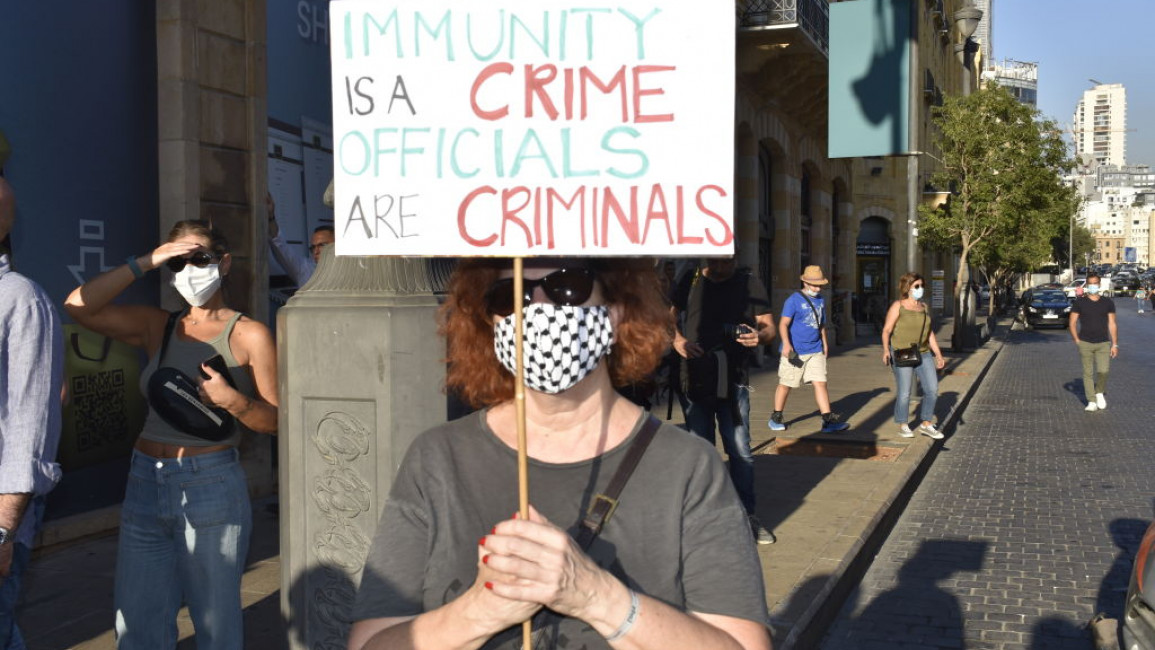Lebanese diaspora plan global protests to mark Beirut blast first anniversary
A global network of Lebanese diaspora is planning worldwide protests on Wednesday to mark the first anniversary of the Beirut blast.
Meghterbin Mejtemiin will commemorate the deadly explosion with protests and online commemorations from Sydney to San Francisco, one year after the disaster that devastated Beirut.
On 4 August 2020, 2,750 tons of ammonium nitrate, unsafely stored at the state-managed Port of Beirut, exploded. The blast killed more than 200 people, injured 7,000 others, and devastated half of the city.
The protesters will not only show solidarity for victims of the largest non-nuclear explosion in history but also demand transparency and accountability from the Lebanese government.
There are planned demonstrations outside Lebanese diplomatic missions in Montreal, San Francisco, Berlin, Amsterdam, London, Geneva, and Brussels, as well as online protests for places under lockdown, including Australia. A list of local times and places for the protests was posted to Meghterbin Mejtemiin Instagram account.
"The country’s ruling class has [since the Beirut port blast] struggled to respond to its multiple crises, with electricity shortages, unprecedented levels of hyperinflation, and lack of access to essential goods plaguing the country"
Lebanon's humanitarian crisis has worsened since the blast. Combined with the ongoing economic crisis since October 2019, as well as the harsh impacts of Covid-19, around a fifth of the population are now living in extreme poverty. A much-needed new government is yet to have taken shape after parties failed to break the political gridlock - hindering access to foreign aid.
Last month, Lebanese riot police fired tear gas and clashed with protesters who marched in honour of those that had died in the blast. Hundreds of people gathered outside the home of caretaker Interior Minister Mohamed Fehmi and carried empty carried coffins for a symbolic funeral amid growing anger at the "obstruction of an investigation".
When asked about the importance of the protests, Stephani Moukhaiber, Global Communication Chair of Meghterbin Mejtemiin and a member of their international coordination team in Montreal told The New Arab, “it all comes down to one thing and one thing only, justice! The fact that there hasn’t been a single person charged for this massacre is utter nonsense, it really is an indicator of our government's level of incompetence and inhumanity”.
Moukhaiber added, “what we demand is clear: lift the immunities and ensure an independent judiciary body to oversee the case”.
The public's frustration for due process and justice has been evident since the blast happened. In the immediate aftermath of the explosion, the uproar intensified after the Lebanese political establishment attempted to evade accountability. Interior Minister Mohammed Fehmi shifted blame to Lebanon's custom department, who subsequently shifted the blame elsewhere. This led to Beirut being consumed by an incendiary atmosphere.
For a proportion of Beirut's citizens, however, this atmosphere was tempered by the arrival of French President Emmanuel Macron just 48 hours after the explosion. Whilst he consoled crowds, Macron promised that "France would never let Lebanon go" and would help rebuild the city. This comment, with overtures of Lebanon's colonial past, also angered many.
Hassan Diab’s government stepped down just six days after the explosion due to this public outcry and anger. Up until July 2021 Lebanon was led by a caretaker government under Saad Hariri, who had previously resigned as prime minister after the October 2019 Revolution.
On the same day, Diab appointed the Judicial Council - which has no appeal process - to deal with the case and has failed to deliver justice to the people of Lebanon. This failure has been widely condemned by rights groups Amnesty International and Human Rights Watch, who have urged the Lebanese political establishment and judiciary to bring justice to the victims.
The country's ruling class has struggled to respond to its multiple crises, with electricity shortages, unprecedented levels of hyperinflation, and a lack of access to essential goods plaguing the country. With the resignation of Saad Al-Hariri earlier this month, and Najib Mikati announced as the prime minister-designate, Lebanon will have had three premiers since the Port of Beirut Blast.
Sahar Amer is a freelance journalist based in London. She holds a master's degree in Human Rights, Culture & Social Justice from Goldsmiths, University of London and her research interests include technology and digital rights.



